Advanced Management Accounting: Role, Techniques, and Career
VerifiedAdded on 2019/12/18
|12
|3580
|123
Report
AI Summary
This report delves into the realm of advanced management accounting, examining its core concepts and practical applications. It begins by defining the role of a management accountant in today's dynamic business environment, highlighting the evolution of their responsibilities and the skills required to succeed. The report then explores strategic management accounting, outlining various techniques such as SWOT analysis, cost-benefit analysis, and customer satisfaction analysis, and explaining how these tools can be leveraged to enhance organizational performance. The report also considers the career prospects in management accounting and concludes by emphasizing the importance of continuous improvement and strategic decision-making. The report references various authors to support the statements.
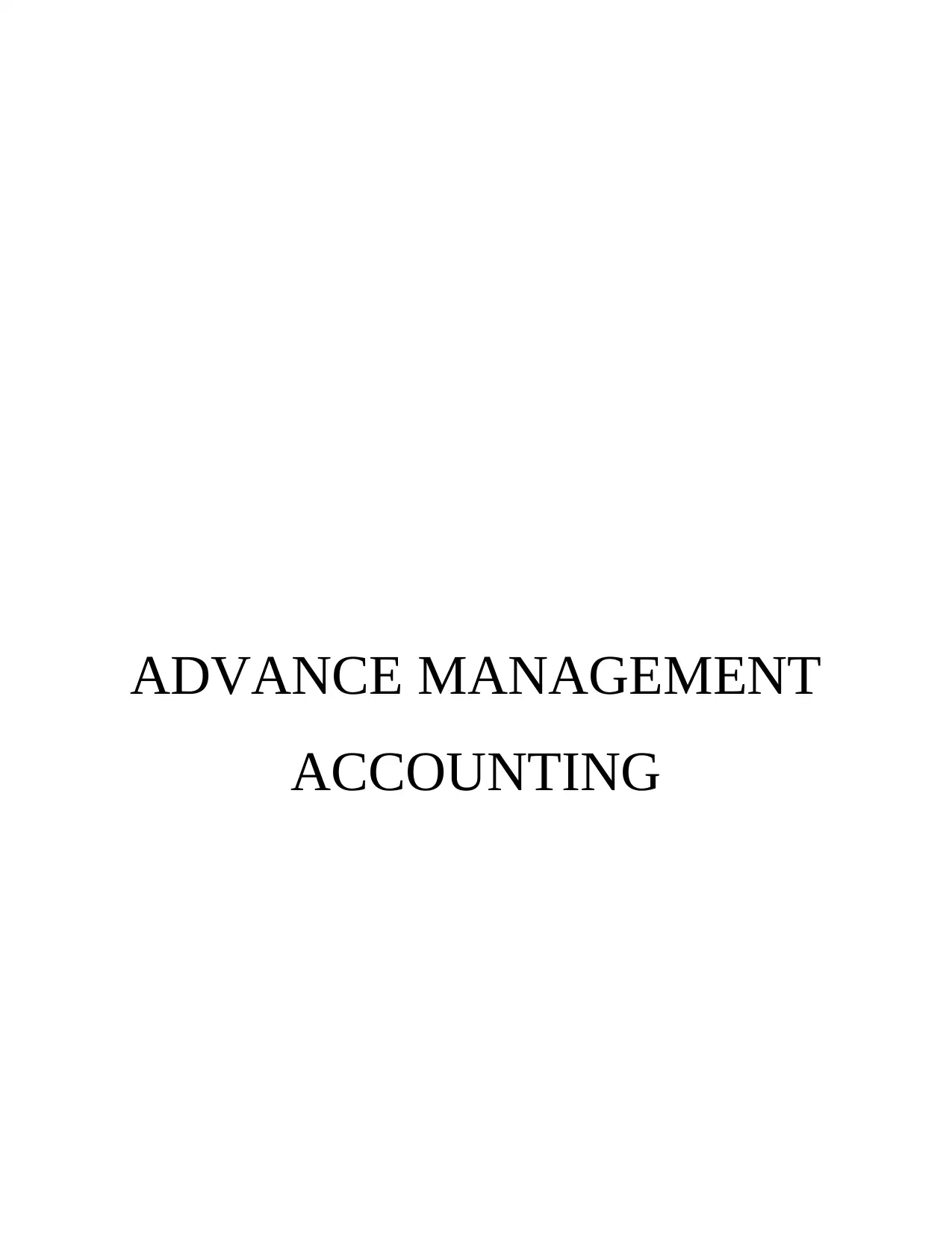
ADVANCE MANAGEMENT
ACCOUNTING
ACCOUNTING
Paraphrase This Document
Need a fresh take? Get an instant paraphrase of this document with our AI Paraphraser
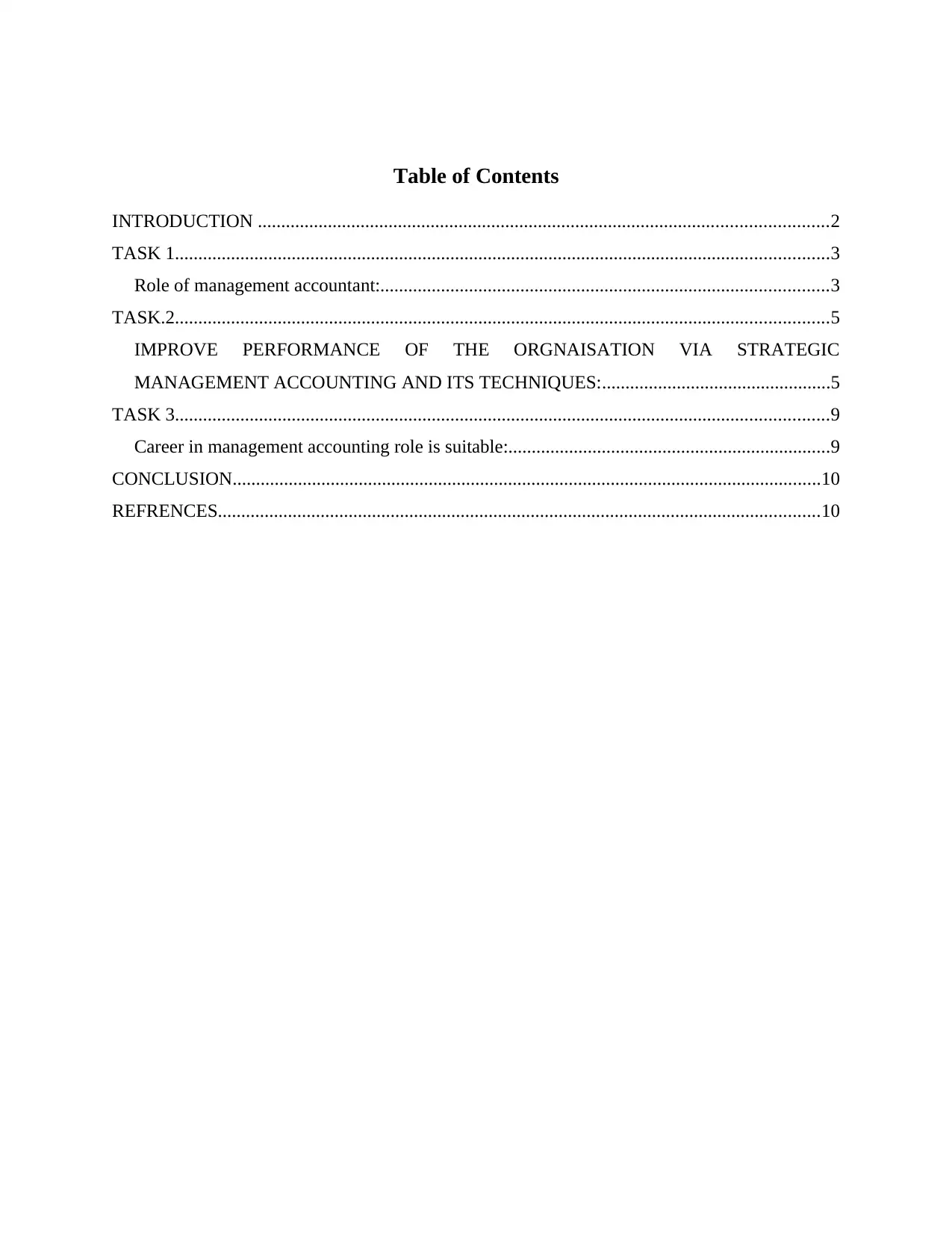
Table of Contents
INTRODUCTION ..........................................................................................................................2
TASK 1............................................................................................................................................3
Role of management accountant:................................................................................................3
TASK.2............................................................................................................................................5
IMPROVE PERFORMANCE OF THE ORGNAISATION VIA STRATEGIC
MANAGEMENT ACCOUNTING AND ITS TECHNIQUES:.................................................5
TASK 3............................................................................................................................................9
Career in management accounting role is suitable:.....................................................................9
CONCLUSION..............................................................................................................................10
REFRENCES.................................................................................................................................10
INTRODUCTION ..........................................................................................................................2
TASK 1............................................................................................................................................3
Role of management accountant:................................................................................................3
TASK.2............................................................................................................................................5
IMPROVE PERFORMANCE OF THE ORGNAISATION VIA STRATEGIC
MANAGEMENT ACCOUNTING AND ITS TECHNIQUES:.................................................5
TASK 3............................................................................................................................................9
Career in management accounting role is suitable:.....................................................................9
CONCLUSION..............................................................................................................................10
REFRENCES.................................................................................................................................10
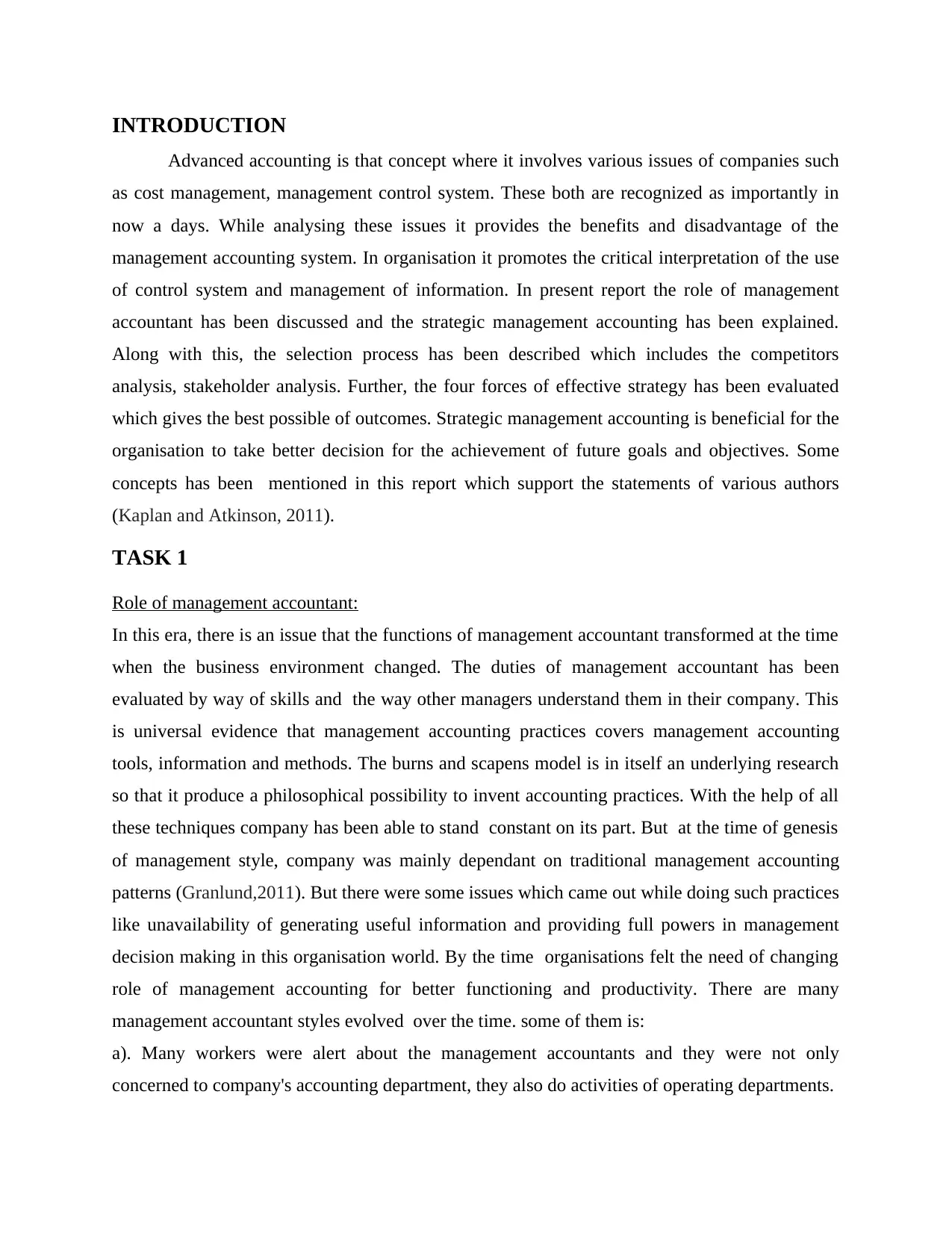
INTRODUCTION
Advanced accounting is that concept where it involves various issues of companies such
as cost management, management control system. These both are recognized as importantly in
now a days. While analysing these issues it provides the benefits and disadvantage of the
management accounting system. In organisation it promotes the critical interpretation of the use
of control system and management of information. In present report the role of management
accountant has been discussed and the strategic management accounting has been explained.
Along with this, the selection process has been described which includes the competitors
analysis, stakeholder analysis. Further, the four forces of effective strategy has been evaluated
which gives the best possible of outcomes. Strategic management accounting is beneficial for the
organisation to take better decision for the achievement of future goals and objectives. Some
concepts has been mentioned in this report which support the statements of various authors
(Kaplan and Atkinson, 2011).
TASK 1
Role of management accountant:
In this era, there is an issue that the functions of management accountant transformed at the time
when the business environment changed. The duties of management accountant has been
evaluated by way of skills and the way other managers understand them in their company. This
is universal evidence that management accounting practices covers management accounting
tools, information and methods. The burns and scapens model is in itself an underlying research
so that it produce a philosophical possibility to invent accounting practices. With the help of all
these techniques company has been able to stand constant on its part. But at the time of genesis
of management style, company was mainly dependant on traditional management accounting
patterns (Granlund,2011). But there were some issues which came out while doing such practices
like unavailability of generating useful information and providing full powers in management
decision making in this organisation world. By the time organisations felt the need of changing
role of management accounting for better functioning and productivity. There are many
management accountant styles evolved over the time. some of them is:
a). Many workers were alert about the management accountants and they were not only
concerned to company's accounting department, they also do activities of operating departments.
Advanced accounting is that concept where it involves various issues of companies such
as cost management, management control system. These both are recognized as importantly in
now a days. While analysing these issues it provides the benefits and disadvantage of the
management accounting system. In organisation it promotes the critical interpretation of the use
of control system and management of information. In present report the role of management
accountant has been discussed and the strategic management accounting has been explained.
Along with this, the selection process has been described which includes the competitors
analysis, stakeholder analysis. Further, the four forces of effective strategy has been evaluated
which gives the best possible of outcomes. Strategic management accounting is beneficial for the
organisation to take better decision for the achievement of future goals and objectives. Some
concepts has been mentioned in this report which support the statements of various authors
(Kaplan and Atkinson, 2011).
TASK 1
Role of management accountant:
In this era, there is an issue that the functions of management accountant transformed at the time
when the business environment changed. The duties of management accountant has been
evaluated by way of skills and the way other managers understand them in their company. This
is universal evidence that management accounting practices covers management accounting
tools, information and methods. The burns and scapens model is in itself an underlying research
so that it produce a philosophical possibility to invent accounting practices. With the help of all
these techniques company has been able to stand constant on its part. But at the time of genesis
of management style, company was mainly dependant on traditional management accounting
patterns (Granlund,2011). But there were some issues which came out while doing such practices
like unavailability of generating useful information and providing full powers in management
decision making in this organisation world. By the time organisations felt the need of changing
role of management accounting for better functioning and productivity. There are many
management accountant styles evolved over the time. some of them is:
a). Many workers were alert about the management accountants and they were not only
concerned to company's accounting department, they also do activities of operating departments.
⊘ This is a preview!⊘
Do you want full access?
Subscribe today to unlock all pages.

Trusted by 1+ million students worldwide
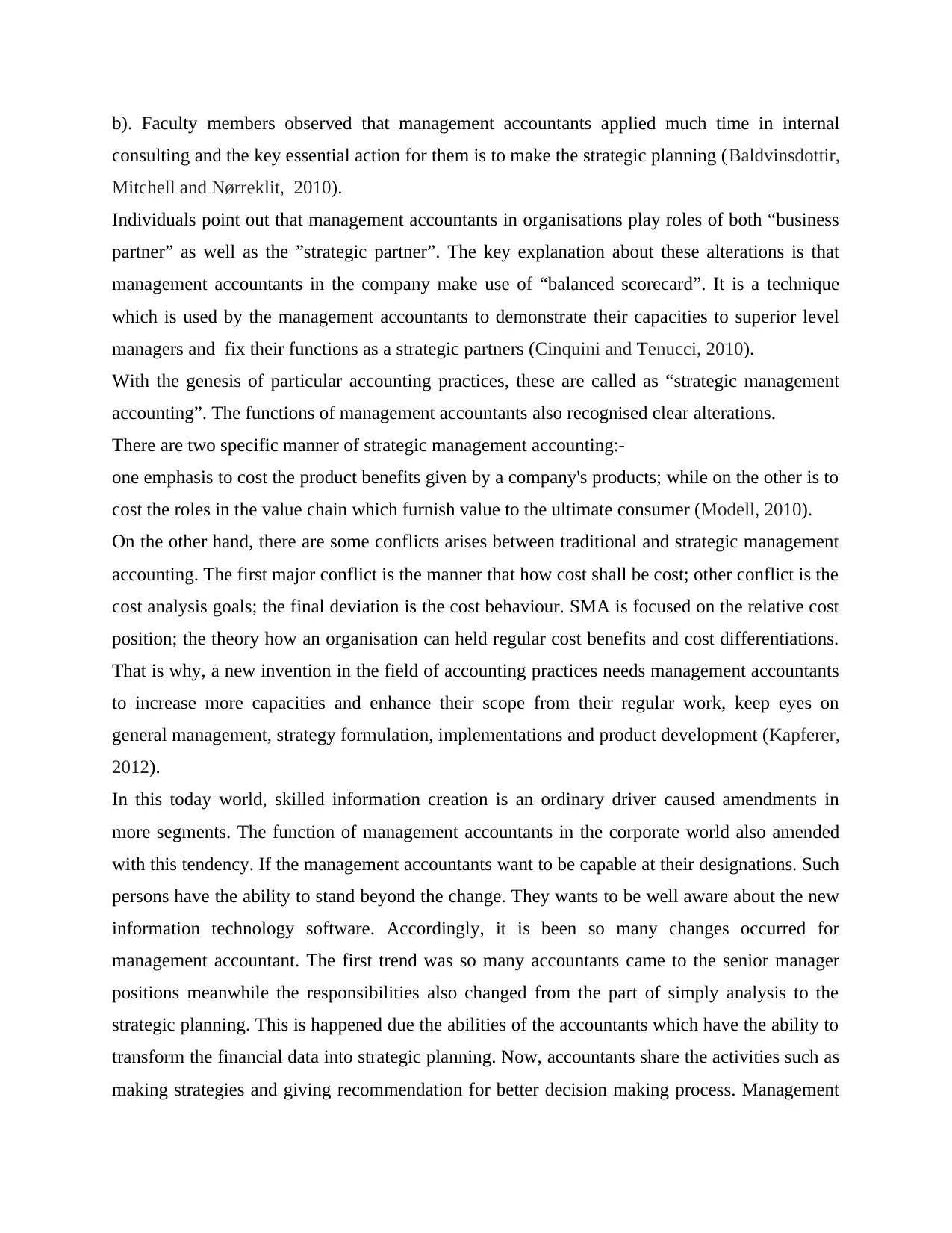
b). Faculty members observed that management accountants applied much time in internal
consulting and the key essential action for them is to make the strategic planning (Baldvinsdottir,
Mitchell and Nørreklit, 2010).
Individuals point out that management accountants in organisations play roles of both “business
partner” as well as the ”strategic partner”. The key explanation about these alterations is that
management accountants in the company make use of “balanced scorecard”. It is a technique
which is used by the management accountants to demonstrate their capacities to superior level
managers and fix their functions as a strategic partners (Cinquini and Tenucci, 2010).
With the genesis of particular accounting practices, these are called as “strategic management
accounting”. The functions of management accountants also recognised clear alterations.
There are two specific manner of strategic management accounting:-
one emphasis to cost the product benefits given by a company's products; while on the other is to
cost the roles in the value chain which furnish value to the ultimate consumer (Modell, 2010).
On the other hand, there are some conflicts arises between traditional and strategic management
accounting. The first major conflict is the manner that how cost shall be cost; other conflict is the
cost analysis goals; the final deviation is the cost behaviour. SMA is focused on the relative cost
position; the theory how an organisation can held regular cost benefits and cost differentiations.
That is why, a new invention in the field of accounting practices needs management accountants
to increase more capacities and enhance their scope from their regular work, keep eyes on
general management, strategy formulation, implementations and product development (Kapferer,
2012).
In this today world, skilled information creation is an ordinary driver caused amendments in
more segments. The function of management accountants in the corporate world also amended
with this tendency. If the management accountants want to be capable at their designations. Such
persons have the ability to stand beyond the change. They wants to be well aware about the new
information technology software. Accordingly, it is been so many changes occurred for
management accountant. The first trend was so many accountants came to the senior manager
positions meanwhile the responsibilities also changed from the part of simply analysis to the
strategic planning. This is happened due the abilities of the accountants which have the ability to
transform the financial data into strategic planning. Now, accountants share the activities such as
making strategies and giving recommendation for better decision making process. Management
consulting and the key essential action for them is to make the strategic planning (Baldvinsdottir,
Mitchell and Nørreklit, 2010).
Individuals point out that management accountants in organisations play roles of both “business
partner” as well as the ”strategic partner”. The key explanation about these alterations is that
management accountants in the company make use of “balanced scorecard”. It is a technique
which is used by the management accountants to demonstrate their capacities to superior level
managers and fix their functions as a strategic partners (Cinquini and Tenucci, 2010).
With the genesis of particular accounting practices, these are called as “strategic management
accounting”. The functions of management accountants also recognised clear alterations.
There are two specific manner of strategic management accounting:-
one emphasis to cost the product benefits given by a company's products; while on the other is to
cost the roles in the value chain which furnish value to the ultimate consumer (Modell, 2010).
On the other hand, there are some conflicts arises between traditional and strategic management
accounting. The first major conflict is the manner that how cost shall be cost; other conflict is the
cost analysis goals; the final deviation is the cost behaviour. SMA is focused on the relative cost
position; the theory how an organisation can held regular cost benefits and cost differentiations.
That is why, a new invention in the field of accounting practices needs management accountants
to increase more capacities and enhance their scope from their regular work, keep eyes on
general management, strategy formulation, implementations and product development (Kapferer,
2012).
In this today world, skilled information creation is an ordinary driver caused amendments in
more segments. The function of management accountants in the corporate world also amended
with this tendency. If the management accountants want to be capable at their designations. Such
persons have the ability to stand beyond the change. They wants to be well aware about the new
information technology software. Accordingly, it is been so many changes occurred for
management accountant. The first trend was so many accountants came to the senior manager
positions meanwhile the responsibilities also changed from the part of simply analysis to the
strategic planning. This is happened due the abilities of the accountants which have the ability to
transform the financial data into strategic planning. Now, accountants share the activities such as
making strategies and giving recommendation for better decision making process. Management
Paraphrase This Document
Need a fresh take? Get an instant paraphrase of this document with our AI Paraphraser
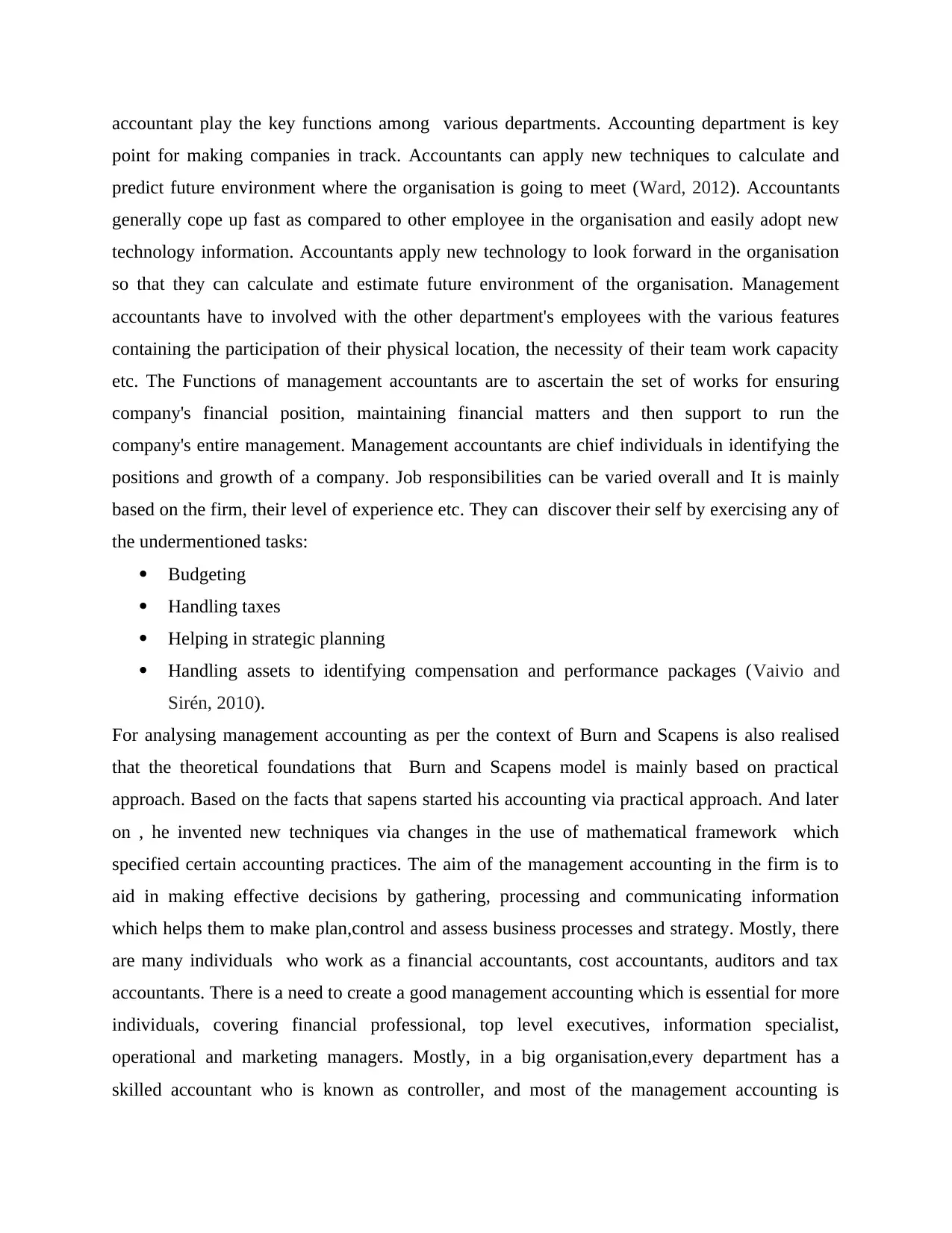
accountant play the key functions among various departments. Accounting department is key
point for making companies in track. Accountants can apply new techniques to calculate and
predict future environment where the organisation is going to meet (Ward, 2012). Accountants
generally cope up fast as compared to other employee in the organisation and easily adopt new
technology information. Accountants apply new technology to look forward in the organisation
so that they can calculate and estimate future environment of the organisation. Management
accountants have to involved with the other department's employees with the various features
containing the participation of their physical location, the necessity of their team work capacity
etc. The Functions of management accountants are to ascertain the set of works for ensuring
company's financial position, maintaining financial matters and then support to run the
company's entire management. Management accountants are chief individuals in identifying the
positions and growth of a company. Job responsibilities can be varied overall and It is mainly
based on the firm, their level of experience etc. They can discover their self by exercising any of
the undermentioned tasks:
Budgeting
Handling taxes
Helping in strategic planning
Handling assets to identifying compensation and performance packages (Vaivio and
Sirén, 2010).
For analysing management accounting as per the context of Burn and Scapens is also realised
that the theoretical foundations that Burn and Scapens model is mainly based on practical
approach. Based on the facts that sapens started his accounting via practical approach. And later
on , he invented new techniques via changes in the use of mathematical framework which
specified certain accounting practices. The aim of the management accounting in the firm is to
aid in making effective decisions by gathering, processing and communicating information
which helps them to make plan,control and assess business processes and strategy. Mostly, there
are many individuals who work as a financial accountants, cost accountants, auditors and tax
accountants. There is a need to create a good management accounting which is essential for more
individuals, covering financial professional, top level executives, information specialist,
operational and marketing managers. Mostly, in a big organisation,every department has a
skilled accountant who is known as controller, and most of the management accounting is
point for making companies in track. Accountants can apply new techniques to calculate and
predict future environment where the organisation is going to meet (Ward, 2012). Accountants
generally cope up fast as compared to other employee in the organisation and easily adopt new
technology information. Accountants apply new technology to look forward in the organisation
so that they can calculate and estimate future environment of the organisation. Management
accountants have to involved with the other department's employees with the various features
containing the participation of their physical location, the necessity of their team work capacity
etc. The Functions of management accountants are to ascertain the set of works for ensuring
company's financial position, maintaining financial matters and then support to run the
company's entire management. Management accountants are chief individuals in identifying the
positions and growth of a company. Job responsibilities can be varied overall and It is mainly
based on the firm, their level of experience etc. They can discover their self by exercising any of
the undermentioned tasks:
Budgeting
Handling taxes
Helping in strategic planning
Handling assets to identifying compensation and performance packages (Vaivio and
Sirén, 2010).
For analysing management accounting as per the context of Burn and Scapens is also realised
that the theoretical foundations that Burn and Scapens model is mainly based on practical
approach. Based on the facts that sapens started his accounting via practical approach. And later
on , he invented new techniques via changes in the use of mathematical framework which
specified certain accounting practices. The aim of the management accounting in the firm is to
aid in making effective decisions by gathering, processing and communicating information
which helps them to make plan,control and assess business processes and strategy. Mostly, there
are many individuals who work as a financial accountants, cost accountants, auditors and tax
accountants. There is a need to create a good management accounting which is essential for more
individuals, covering financial professional, top level executives, information specialist,
operational and marketing managers. Mostly, in a big organisation,every department has a
skilled accountant who is known as controller, and most of the management accounting is
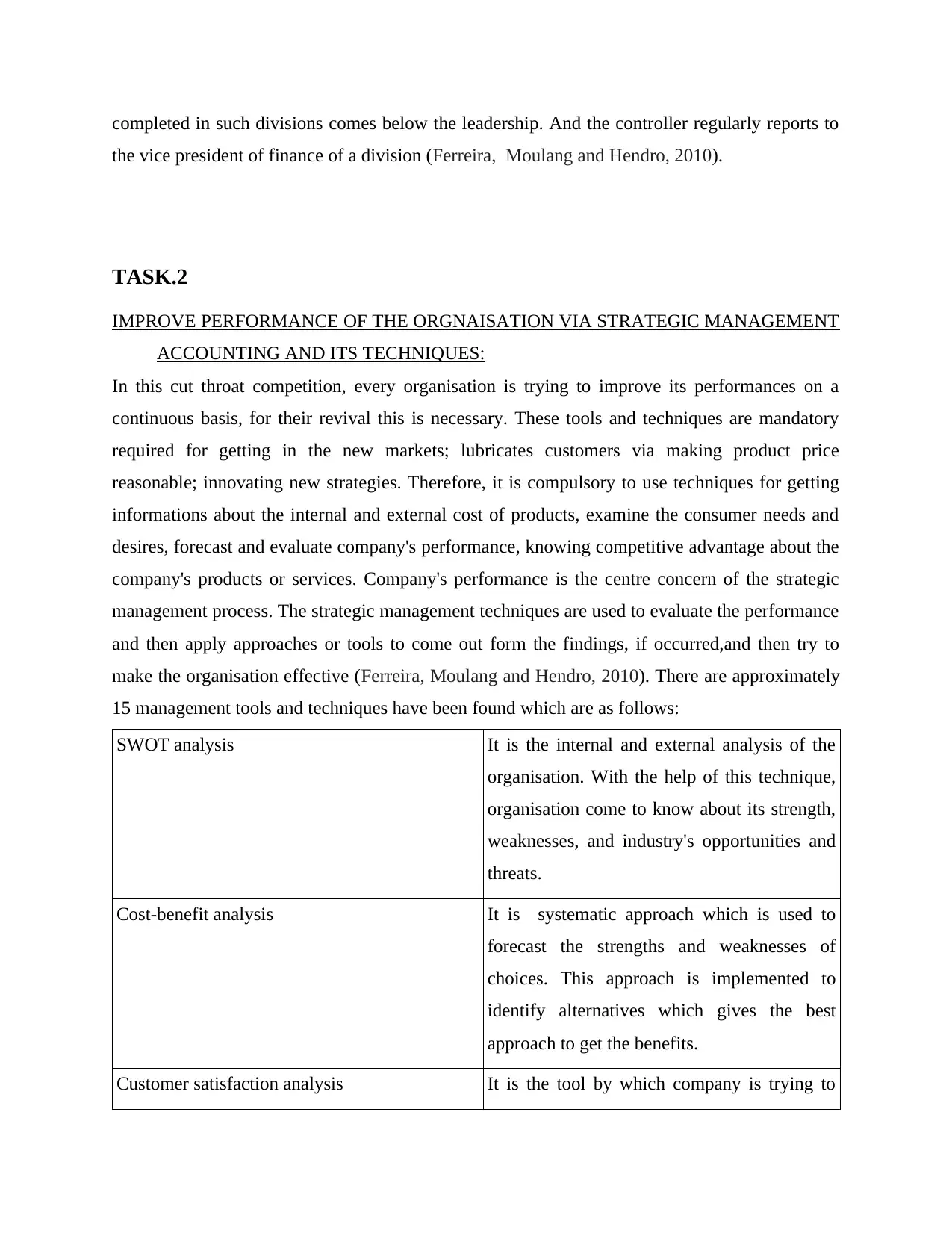
completed in such divisions comes below the leadership. And the controller regularly reports to
the vice president of finance of a division (Ferreira, Moulang and Hendro, 2010).
TASK.2
IMPROVE PERFORMANCE OF THE ORGNAISATION VIA STRATEGIC MANAGEMENT
ACCOUNTING AND ITS TECHNIQUES:
In this cut throat competition, every organisation is trying to improve its performances on a
continuous basis, for their revival this is necessary. These tools and techniques are mandatory
required for getting in the new markets; lubricates customers via making product price
reasonable; innovating new strategies. Therefore, it is compulsory to use techniques for getting
informations about the internal and external cost of products, examine the consumer needs and
desires, forecast and evaluate company's performance, knowing competitive advantage about the
company's products or services. Company's performance is the centre concern of the strategic
management process. The strategic management techniques are used to evaluate the performance
and then apply approaches or tools to come out form the findings, if occurred,and then try to
make the organisation effective (Ferreira, Moulang and Hendro, 2010). There are approximately
15 management tools and techniques have been found which are as follows:
SWOT analysis It is the internal and external analysis of the
organisation. With the help of this technique,
organisation come to know about its strength,
weaknesses, and industry's opportunities and
threats.
Cost-benefit analysis It is systematic approach which is used to
forecast the strengths and weaknesses of
choices. This approach is implemented to
identify alternatives which gives the best
approach to get the benefits.
Customer satisfaction analysis It is the tool by which company is trying to
the vice president of finance of a division (Ferreira, Moulang and Hendro, 2010).
TASK.2
IMPROVE PERFORMANCE OF THE ORGNAISATION VIA STRATEGIC MANAGEMENT
ACCOUNTING AND ITS TECHNIQUES:
In this cut throat competition, every organisation is trying to improve its performances on a
continuous basis, for their revival this is necessary. These tools and techniques are mandatory
required for getting in the new markets; lubricates customers via making product price
reasonable; innovating new strategies. Therefore, it is compulsory to use techniques for getting
informations about the internal and external cost of products, examine the consumer needs and
desires, forecast and evaluate company's performance, knowing competitive advantage about the
company's products or services. Company's performance is the centre concern of the strategic
management process. The strategic management techniques are used to evaluate the performance
and then apply approaches or tools to come out form the findings, if occurred,and then try to
make the organisation effective (Ferreira, Moulang and Hendro, 2010). There are approximately
15 management tools and techniques have been found which are as follows:
SWOT analysis It is the internal and external analysis of the
organisation. With the help of this technique,
organisation come to know about its strength,
weaknesses, and industry's opportunities and
threats.
Cost-benefit analysis It is systematic approach which is used to
forecast the strengths and weaknesses of
choices. This approach is implemented to
identify alternatives which gives the best
approach to get the benefits.
Customer satisfaction analysis It is the tool by which company is trying to
⊘ This is a preview!⊘
Do you want full access?
Subscribe today to unlock all pages.

Trusted by 1+ million students worldwide
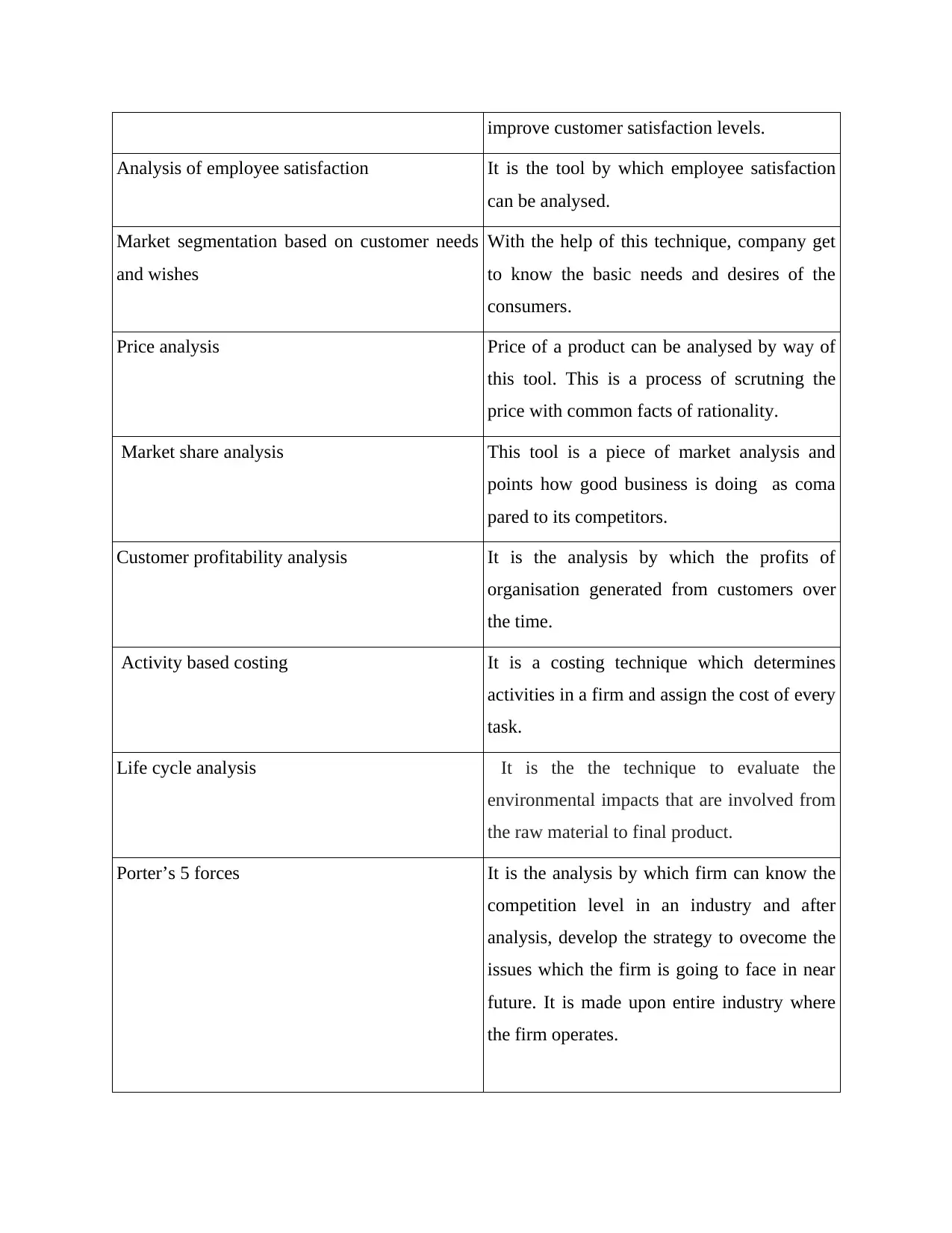
improve customer satisfaction levels.
Analysis of employee satisfaction It is the tool by which employee satisfaction
can be analysed.
Market segmentation based on customer needs
and wishes
With the help of this technique, company get
to know the basic needs and desires of the
consumers.
Price analysis Price of a product can be analysed by way of
this tool. This is a process of scrutning the
price with common facts of rationality.
Market share analysis This tool is a piece of market analysis and
points how good business is doing as coma
pared to its competitors.
Customer profitability analysis It is the analysis by which the profits of
organisation generated from customers over
the time.
Activity based costing It is a costing technique which determines
activities in a firm and assign the cost of every
task.
Life cycle analysis It is the the technique to evaluate the
environmental impacts that are involved from
the raw material to final product.
Porter’s 5 forces It is the analysis by which firm can know the
competition level in an industry and after
analysis, develop the strategy to ovecome the
issues which the firm is going to face in near
future. It is made upon entire industry where
the firm operates.
Analysis of employee satisfaction It is the tool by which employee satisfaction
can be analysed.
Market segmentation based on customer needs
and wishes
With the help of this technique, company get
to know the basic needs and desires of the
consumers.
Price analysis Price of a product can be analysed by way of
this tool. This is a process of scrutning the
price with common facts of rationality.
Market share analysis This tool is a piece of market analysis and
points how good business is doing as coma
pared to its competitors.
Customer profitability analysis It is the analysis by which the profits of
organisation generated from customers over
the time.
Activity based costing It is a costing technique which determines
activities in a firm and assign the cost of every
task.
Life cycle analysis It is the the technique to evaluate the
environmental impacts that are involved from
the raw material to final product.
Porter’s 5 forces It is the analysis by which firm can know the
competition level in an industry and after
analysis, develop the strategy to ovecome the
issues which the firm is going to face in near
future. It is made upon entire industry where
the firm operates.
Paraphrase This Document
Need a fresh take? Get an instant paraphrase of this document with our AI Paraphraser
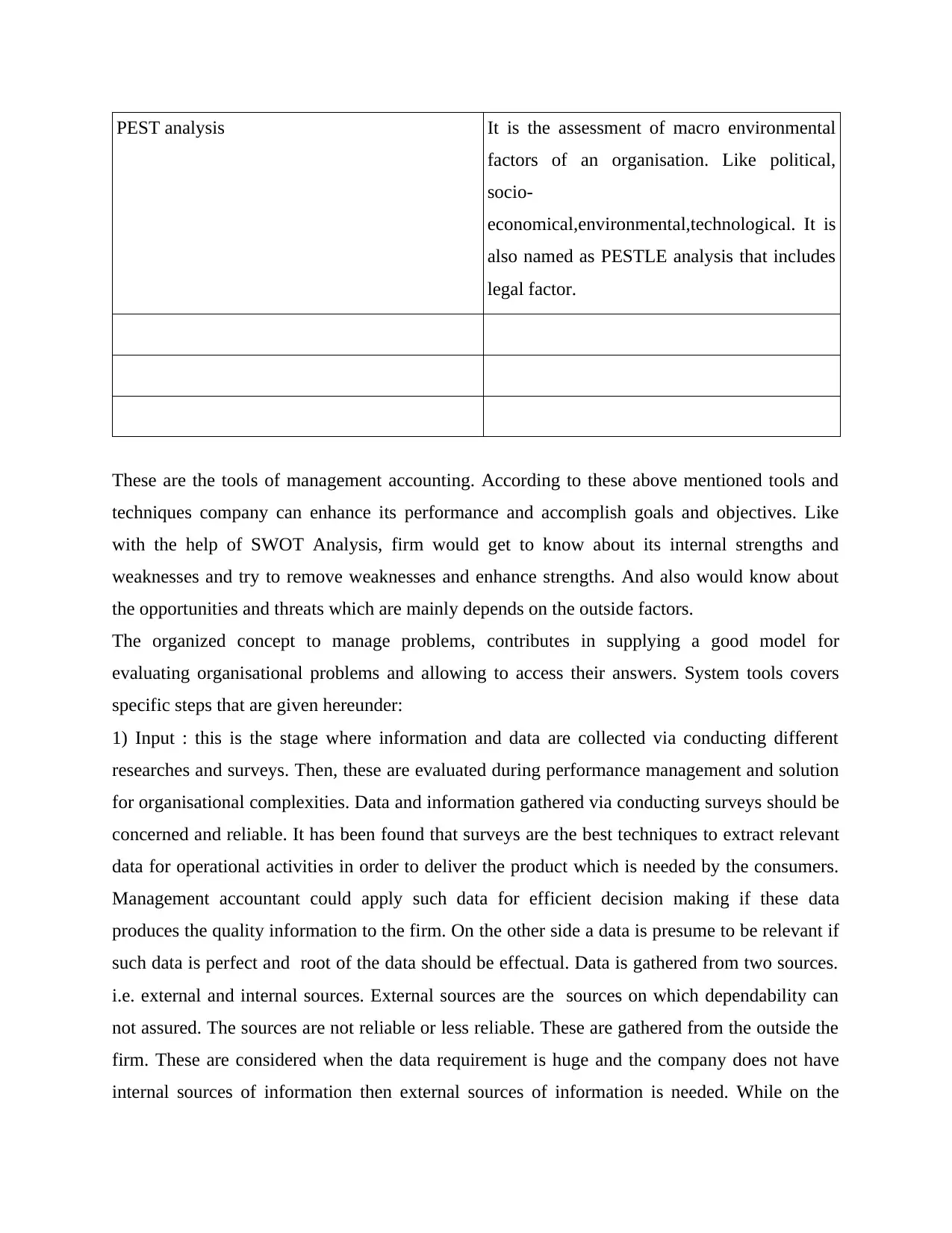
PEST analysis It is the assessment of macro environmental
factors of an organisation. Like political,
socio-
economical,environmental,technological. It is
also named as PESTLE analysis that includes
legal factor.
These are the tools of management accounting. According to these above mentioned tools and
techniques company can enhance its performance and accomplish goals and objectives. Like
with the help of SWOT Analysis, firm would get to know about its internal strengths and
weaknesses and try to remove weaknesses and enhance strengths. And also would know about
the opportunities and threats which are mainly depends on the outside factors.
The organized concept to manage problems, contributes in supplying a good model for
evaluating organisational problems and allowing to access their answers. System tools covers
specific steps that are given hereunder:
1) Input : this is the stage where information and data are collected via conducting different
researches and surveys. Then, these are evaluated during performance management and solution
for organisational complexities. Data and information gathered via conducting surveys should be
concerned and reliable. It has been found that surveys are the best techniques to extract relevant
data for operational activities in order to deliver the product which is needed by the consumers.
Management accountant could apply such data for efficient decision making if these data
produces the quality information to the firm. On the other side a data is presume to be relevant if
such data is perfect and root of the data should be effectual. Data is gathered from two sources.
i.e. external and internal sources. External sources are the sources on which dependability can
not assured. The sources are not reliable or less reliable. These are gathered from the outside the
firm. These are considered when the data requirement is huge and the company does not have
internal sources of information then external sources of information is needed. While on the
factors of an organisation. Like political,
socio-
economical,environmental,technological. It is
also named as PESTLE analysis that includes
legal factor.
These are the tools of management accounting. According to these above mentioned tools and
techniques company can enhance its performance and accomplish goals and objectives. Like
with the help of SWOT Analysis, firm would get to know about its internal strengths and
weaknesses and try to remove weaknesses and enhance strengths. And also would know about
the opportunities and threats which are mainly depends on the outside factors.
The organized concept to manage problems, contributes in supplying a good model for
evaluating organisational problems and allowing to access their answers. System tools covers
specific steps that are given hereunder:
1) Input : this is the stage where information and data are collected via conducting different
researches and surveys. Then, these are evaluated during performance management and solution
for organisational complexities. Data and information gathered via conducting surveys should be
concerned and reliable. It has been found that surveys are the best techniques to extract relevant
data for operational activities in order to deliver the product which is needed by the consumers.
Management accountant could apply such data for efficient decision making if these data
produces the quality information to the firm. On the other side a data is presume to be relevant if
such data is perfect and root of the data should be effectual. Data is gathered from two sources.
i.e. external and internal sources. External sources are the sources on which dependability can
not assured. The sources are not reliable or less reliable. These are gathered from the outside the
firm. These are considered when the data requirement is huge and the company does not have
internal sources of information then external sources of information is needed. While on the
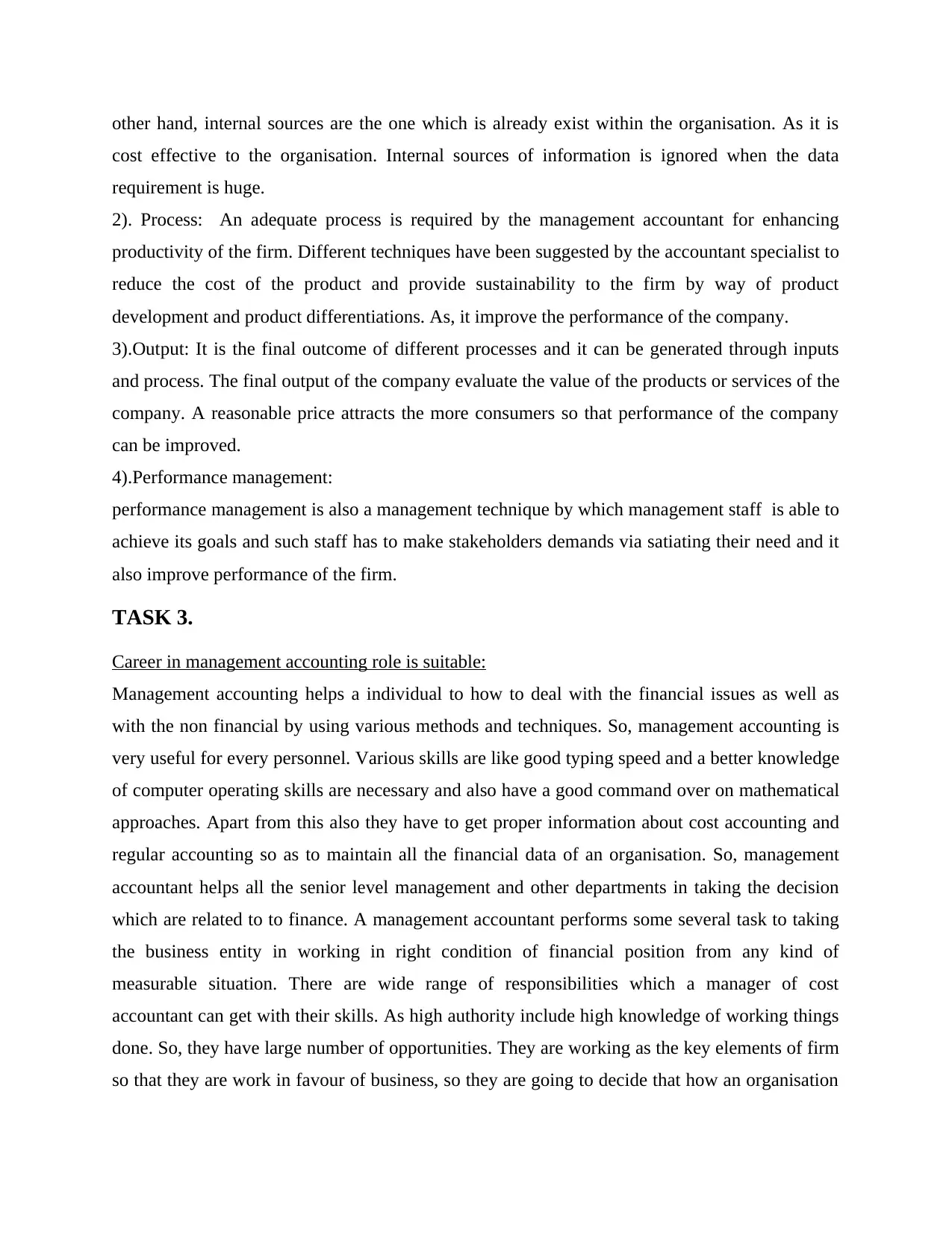
other hand, internal sources are the one which is already exist within the organisation. As it is
cost effective to the organisation. Internal sources of information is ignored when the data
requirement is huge.
2). Process: An adequate process is required by the management accountant for enhancing
productivity of the firm. Different techniques have been suggested by the accountant specialist to
reduce the cost of the product and provide sustainability to the firm by way of product
development and product differentiations. As, it improve the performance of the company.
3).Output: It is the final outcome of different processes and it can be generated through inputs
and process. The final output of the company evaluate the value of the products or services of the
company. A reasonable price attracts the more consumers so that performance of the company
can be improved.
4).Performance management:
performance management is also a management technique by which management staff is able to
achieve its goals and such staff has to make stakeholders demands via satiating their need and it
also improve performance of the firm.
TASK 3.
Career in management accounting role is suitable:
Management accounting helps a individual to how to deal with the financial issues as well as
with the non financial by using various methods and techniques. So, management accounting is
very useful for every personnel. Various skills are like good typing speed and a better knowledge
of computer operating skills are necessary and also have a good command over on mathematical
approaches. Apart from this also they have to get proper information about cost accounting and
regular accounting so as to maintain all the financial data of an organisation. So, management
accountant helps all the senior level management and other departments in taking the decision
which are related to to finance. A management accountant performs some several task to taking
the business entity in working in right condition of financial position from any kind of
measurable situation. There are wide range of responsibilities which a manager of cost
accountant can get with their skills. As high authority include high knowledge of working things
done. So, they have large number of opportunities. They are working as the key elements of firm
so that they are work in favour of business, so they are going to decide that how an organisation
cost effective to the organisation. Internal sources of information is ignored when the data
requirement is huge.
2). Process: An adequate process is required by the management accountant for enhancing
productivity of the firm. Different techniques have been suggested by the accountant specialist to
reduce the cost of the product and provide sustainability to the firm by way of product
development and product differentiations. As, it improve the performance of the company.
3).Output: It is the final outcome of different processes and it can be generated through inputs
and process. The final output of the company evaluate the value of the products or services of the
company. A reasonable price attracts the more consumers so that performance of the company
can be improved.
4).Performance management:
performance management is also a management technique by which management staff is able to
achieve its goals and such staff has to make stakeholders demands via satiating their need and it
also improve performance of the firm.
TASK 3.
Career in management accounting role is suitable:
Management accounting helps a individual to how to deal with the financial issues as well as
with the non financial by using various methods and techniques. So, management accounting is
very useful for every personnel. Various skills are like good typing speed and a better knowledge
of computer operating skills are necessary and also have a good command over on mathematical
approaches. Apart from this also they have to get proper information about cost accounting and
regular accounting so as to maintain all the financial data of an organisation. So, management
accountant helps all the senior level management and other departments in taking the decision
which are related to to finance. A management accountant performs some several task to taking
the business entity in working in right condition of financial position from any kind of
measurable situation. There are wide range of responsibilities which a manager of cost
accountant can get with their skills. As high authority include high knowledge of working things
done. So, they have large number of opportunities. They are working as the key elements of firm
so that they are work in favour of business, so they are going to decide that how an organisation
⊘ This is a preview!⊘
Do you want full access?
Subscribe today to unlock all pages.

Trusted by 1+ million students worldwide
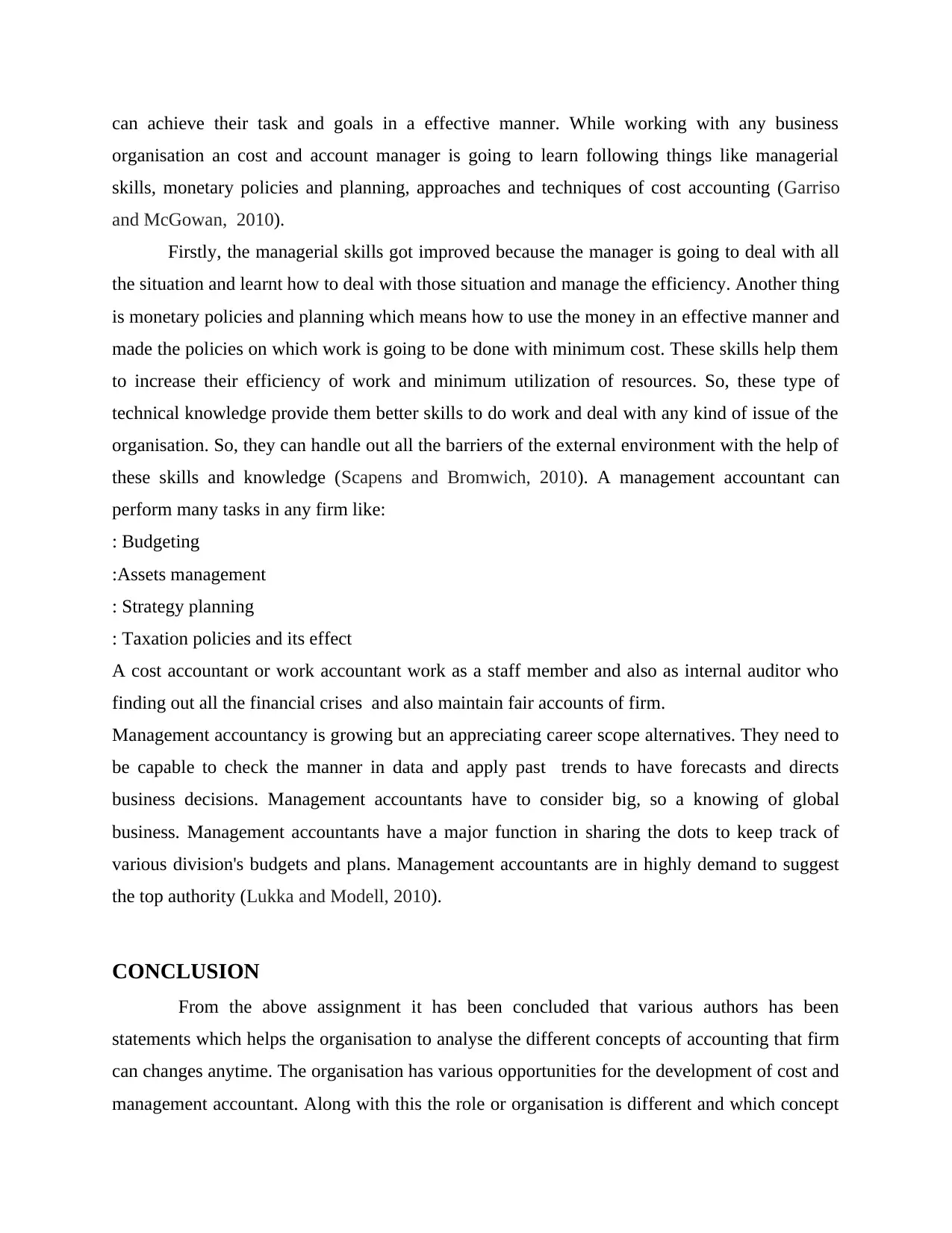
can achieve their task and goals in a effective manner. While working with any business
organisation an cost and account manager is going to learn following things like managerial
skills, monetary policies and planning, approaches and techniques of cost accounting (Garriso
and McGowan, 2010).
Firstly, the managerial skills got improved because the manager is going to deal with all
the situation and learnt how to deal with those situation and manage the efficiency. Another thing
is monetary policies and planning which means how to use the money in an effective manner and
made the policies on which work is going to be done with minimum cost. These skills help them
to increase their efficiency of work and minimum utilization of resources. So, these type of
technical knowledge provide them better skills to do work and deal with any kind of issue of the
organisation. So, they can handle out all the barriers of the external environment with the help of
these skills and knowledge (Scapens and Bromwich, 2010). A management accountant can
perform many tasks in any firm like:
: Budgeting
:Assets management
: Strategy planning
: Taxation policies and its effect
A cost accountant or work accountant work as a staff member and also as internal auditor who
finding out all the financial crises and also maintain fair accounts of firm.
Management accountancy is growing but an appreciating career scope alternatives. They need to
be capable to check the manner in data and apply past trends to have forecasts and directs
business decisions. Management accountants have to consider big, so a knowing of global
business. Management accountants have a major function in sharing the dots to keep track of
various division's budgets and plans. Management accountants are in highly demand to suggest
the top authority (Lukka and Modell, 2010).
CONCLUSION
From the above assignment it has been concluded that various authors has been
statements which helps the organisation to analyse the different concepts of accounting that firm
can changes anytime. The organisation has various opportunities for the development of cost and
management accountant. Along with this the role or organisation is different and which concept
organisation an cost and account manager is going to learn following things like managerial
skills, monetary policies and planning, approaches and techniques of cost accounting (Garriso
and McGowan, 2010).
Firstly, the managerial skills got improved because the manager is going to deal with all
the situation and learnt how to deal with those situation and manage the efficiency. Another thing
is monetary policies and planning which means how to use the money in an effective manner and
made the policies on which work is going to be done with minimum cost. These skills help them
to increase their efficiency of work and minimum utilization of resources. So, these type of
technical knowledge provide them better skills to do work and deal with any kind of issue of the
organisation. So, they can handle out all the barriers of the external environment with the help of
these skills and knowledge (Scapens and Bromwich, 2010). A management accountant can
perform many tasks in any firm like:
: Budgeting
:Assets management
: Strategy planning
: Taxation policies and its effect
A cost accountant or work accountant work as a staff member and also as internal auditor who
finding out all the financial crises and also maintain fair accounts of firm.
Management accountancy is growing but an appreciating career scope alternatives. They need to
be capable to check the manner in data and apply past trends to have forecasts and directs
business decisions. Management accountants have to consider big, so a knowing of global
business. Management accountants have a major function in sharing the dots to keep track of
various division's budgets and plans. Management accountants are in highly demand to suggest
the top authority (Lukka and Modell, 2010).
CONCLUSION
From the above assignment it has been concluded that various authors has been
statements which helps the organisation to analyse the different concepts of accounting that firm
can changes anytime. The organisation has various opportunities for the development of cost and
management accountant. Along with this the role or organisation is different and which concept
Paraphrase This Document
Need a fresh take? Get an instant paraphrase of this document with our AI Paraphraser
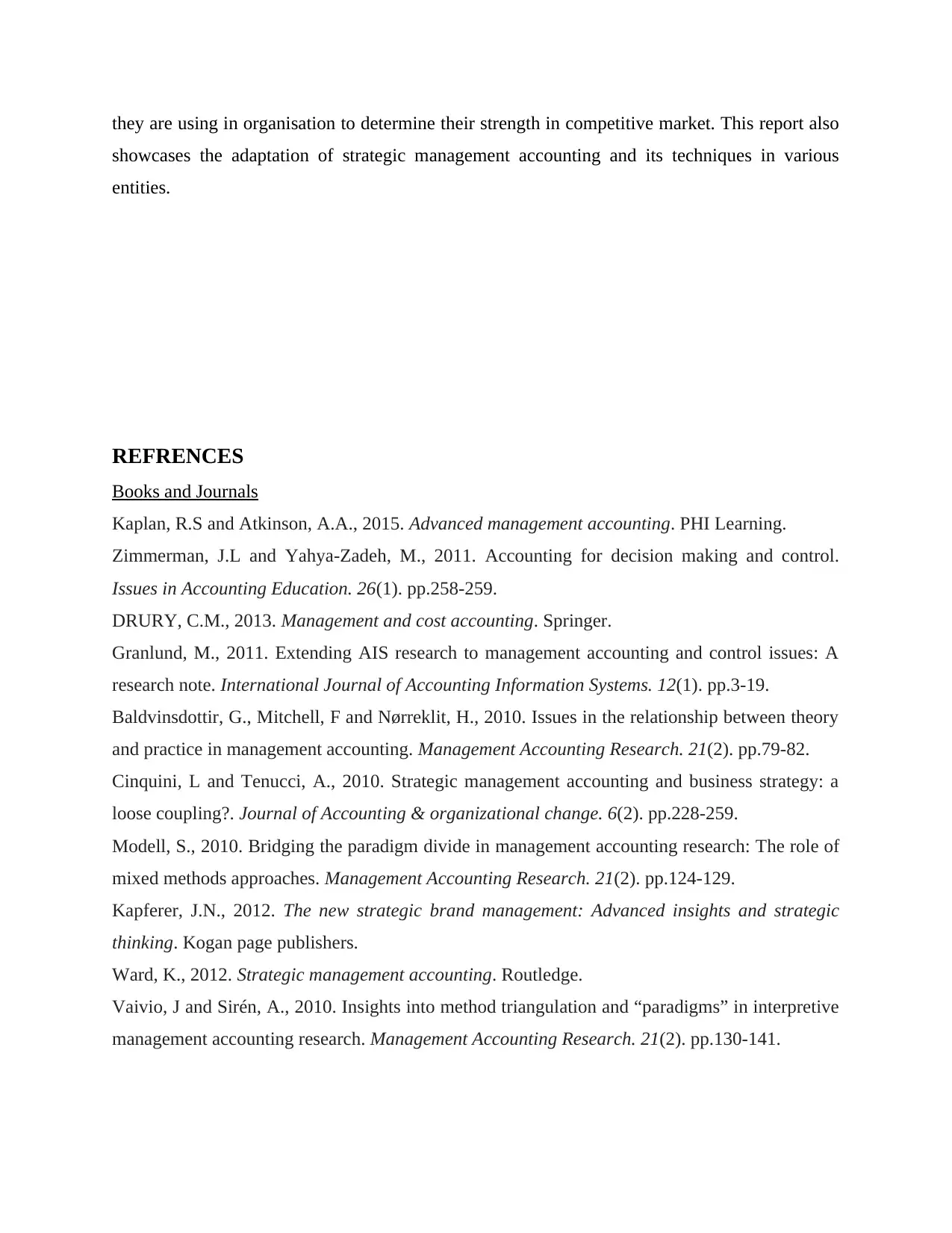
they are using in organisation to determine their strength in competitive market. This report also
showcases the adaptation of strategic management accounting and its techniques in various
entities.
REFRENCES
Books and Journals
Kaplan, R.S and Atkinson, A.A., 2015. Advanced management accounting. PHI Learning.
Zimmerman, J.L and Yahya-Zadeh, M., 2011. Accounting for decision making and control.
Issues in Accounting Education. 26(1). pp.258-259.
DRURY, C.M., 2013. Management and cost accounting. Springer.
Granlund, M., 2011. Extending AIS research to management accounting and control issues: A
research note. International Journal of Accounting Information Systems. 12(1). pp.3-19.
Baldvinsdottir, G., Mitchell, F and Nørreklit, H., 2010. Issues in the relationship between theory
and practice in management accounting. Management Accounting Research. 21(2). pp.79-82.
Cinquini, L and Tenucci, A., 2010. Strategic management accounting and business strategy: a
loose coupling?. Journal of Accounting & organizational change. 6(2). pp.228-259.
Modell, S., 2010. Bridging the paradigm divide in management accounting research: The role of
mixed methods approaches. Management Accounting Research. 21(2). pp.124-129.
Kapferer, J.N., 2012. The new strategic brand management: Advanced insights and strategic
thinking. Kogan page publishers.
Ward, K., 2012. Strategic management accounting. Routledge.
Vaivio, J and Sirén, A., 2010. Insights into method triangulation and “paradigms” in interpretive
management accounting research. Management Accounting Research. 21(2). pp.130-141.
showcases the adaptation of strategic management accounting and its techniques in various
entities.
REFRENCES
Books and Journals
Kaplan, R.S and Atkinson, A.A., 2015. Advanced management accounting. PHI Learning.
Zimmerman, J.L and Yahya-Zadeh, M., 2011. Accounting for decision making and control.
Issues in Accounting Education. 26(1). pp.258-259.
DRURY, C.M., 2013. Management and cost accounting. Springer.
Granlund, M., 2011. Extending AIS research to management accounting and control issues: A
research note. International Journal of Accounting Information Systems. 12(1). pp.3-19.
Baldvinsdottir, G., Mitchell, F and Nørreklit, H., 2010. Issues in the relationship between theory
and practice in management accounting. Management Accounting Research. 21(2). pp.79-82.
Cinquini, L and Tenucci, A., 2010. Strategic management accounting and business strategy: a
loose coupling?. Journal of Accounting & organizational change. 6(2). pp.228-259.
Modell, S., 2010. Bridging the paradigm divide in management accounting research: The role of
mixed methods approaches. Management Accounting Research. 21(2). pp.124-129.
Kapferer, J.N., 2012. The new strategic brand management: Advanced insights and strategic
thinking. Kogan page publishers.
Ward, K., 2012. Strategic management accounting. Routledge.
Vaivio, J and Sirén, A., 2010. Insights into method triangulation and “paradigms” in interpretive
management accounting research. Management Accounting Research. 21(2). pp.130-141.
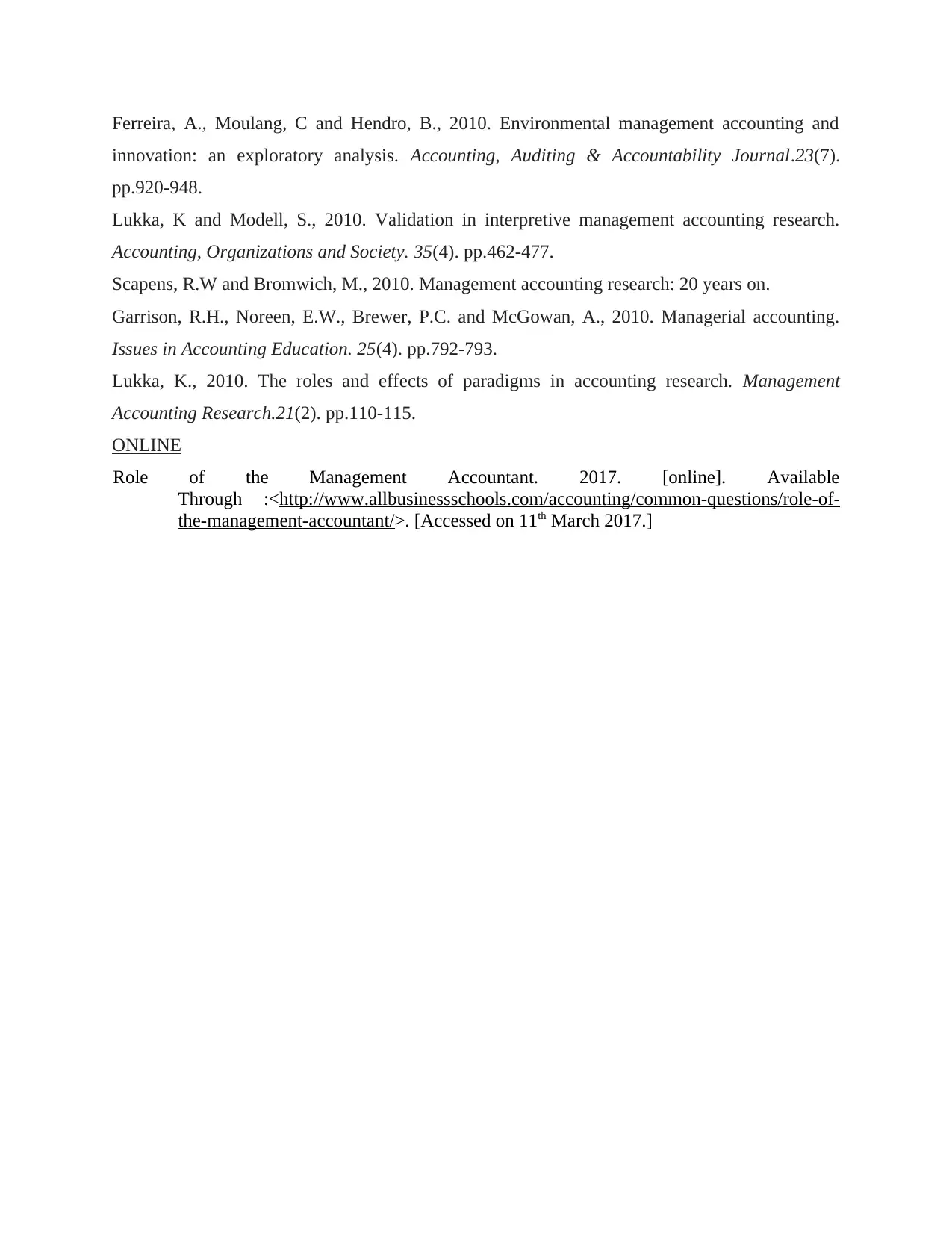
Ferreira, A., Moulang, C and Hendro, B., 2010. Environmental management accounting and
innovation: an exploratory analysis. Accounting, Auditing & Accountability Journal.23(7).
pp.920-948.
Lukka, K and Modell, S., 2010. Validation in interpretive management accounting research.
Accounting, Organizations and Society. 35(4). pp.462-477.
Scapens, R.W and Bromwich, M., 2010. Management accounting research: 20 years on.
Garrison, R.H., Noreen, E.W., Brewer, P.C. and McGowan, A., 2010. Managerial accounting.
Issues in Accounting Education. 25(4). pp.792-793.
Lukka, K., 2010. The roles and effects of paradigms in accounting research. Management
Accounting Research.21(2). pp.110-115.
ONLINE
Role of the Management Accountant. 2017. [online]. Available
Through :<http://www.allbusinessschools.com/accounting/common-questions/role-of-
the-management-accountant/>. [Accessed on 11th March 2017.]
innovation: an exploratory analysis. Accounting, Auditing & Accountability Journal.23(7).
pp.920-948.
Lukka, K and Modell, S., 2010. Validation in interpretive management accounting research.
Accounting, Organizations and Society. 35(4). pp.462-477.
Scapens, R.W and Bromwich, M., 2010. Management accounting research: 20 years on.
Garrison, R.H., Noreen, E.W., Brewer, P.C. and McGowan, A., 2010. Managerial accounting.
Issues in Accounting Education. 25(4). pp.792-793.
Lukka, K., 2010. The roles and effects of paradigms in accounting research. Management
Accounting Research.21(2). pp.110-115.
ONLINE
Role of the Management Accountant. 2017. [online]. Available
Through :<http://www.allbusinessschools.com/accounting/common-questions/role-of-
the-management-accountant/>. [Accessed on 11th March 2017.]
⊘ This is a preview!⊘
Do you want full access?
Subscribe today to unlock all pages.

Trusted by 1+ million students worldwide
1 out of 12
Related Documents
Your All-in-One AI-Powered Toolkit for Academic Success.
+13062052269
info@desklib.com
Available 24*7 on WhatsApp / Email
![[object Object]](/_next/static/media/star-bottom.7253800d.svg)
Unlock your academic potential
Copyright © 2020–2026 A2Z Services. All Rights Reserved. Developed and managed by ZUCOL.




